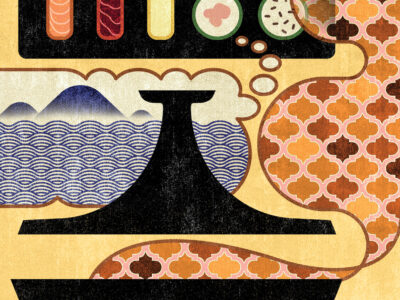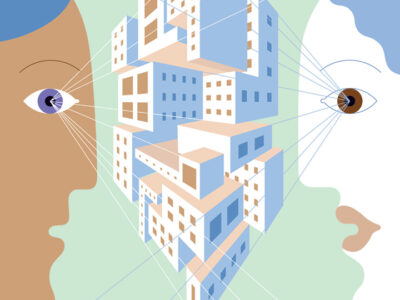
Photographer Tara Todras-Whitehill C’00 EAS’00 has captured some astonishing images of the uprisings in Egypt and Libya. Who knows where her next ones will be from?
Q&A by Samuel Hughes
Photography by Tara Todras-Whitehill
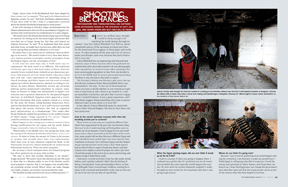
“I never, in a million years, thought I would be lucky enough to be watching the world change through my camera,” says Tara Todras-Whitehill C’00 EAS’00, whose remarkable photos of the uprisings in Egypt and Libya for the Associated Press appear in these pages and on the cover. “It takes jumping off the deep end a lot of times to make your dreams come true, because they don’t tend to fall in your lap.”
Todras-Whitehill was an engineering and international-relations major at Penn, but even before she graduated she realized that what she really wanted to do was photography, with a special lens on women’s issues. After spending a few years assisting photographers in New York, she decided to move to the Middle East in 2005 to pursue photojournalism. Needless to say, she had no idea what to expect.
“My first day in Beirut was February 14th, 2005—the day that [former Lebanese Prime Minister] Rafik Hariri was assassinated,” she says. “It was one of those moments where you have to decide whether to run towards an explosion or away from it, and I chose to go towards it. It was an immediate trial by fire, and after that I moved to Egypt, where I worked freelance. It was a great experience—and I will always suggest doing something a bit crazy to pursue what you want in your career or in your life.”
In late March, Todras-Whitehill spoke by email with senior editor Samuel Hughes. She had no idea where she was going next.
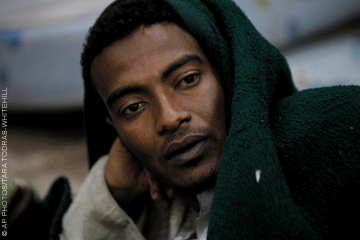
How do the recent uprisings compare with other big breaking stories you’ve covered?
These stories in some ways are completely different than what I have experienced in the past, but even between them, there are levels of understanding and feeling [that are] completely out of my element. I lived in Egypt for two and a half years, and so when I went back in the first days of the revolution, many people told me that this was a different Egypt and that I should be more careful. And I was more cautious than I had been in the past, but I still knew Egypt and that helped me get into the pictures. As for Libya, I don’t think anyone had an idea of what to expect. People had always said that Libyans were slightly closed-off people, but when I got there I found the people in the east to be so warm and inviting, and always trying to help if they could.
I had never covered airstrikes from the side under attack before, and I quickly realized I didn’t like the feeling of being a sitting duck. Some photographers thrive on that, but although I have covered many conflicts, waiting for a plane to fly overhead and hopefully strike near me but not on top of me was not my idea of a good time.
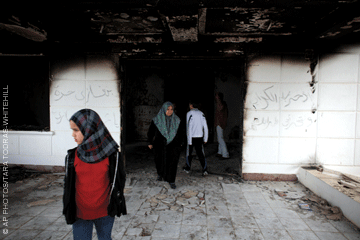
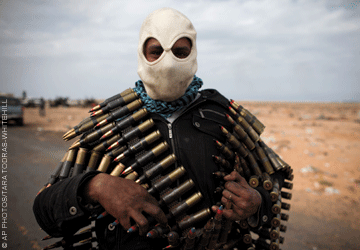
When the Egypt uprising began, did you ever think it would go as far as it did?
I had no concept of what was going to happen there. I realized very quickly that if I predicted one set of events that probably the exact opposite would happen the next day. So even until the minute Mubarak resigned I totally thought we were in this for the long haul, and that it was going to get messy.
Where do you think it’s going now?
Because I was so bad at predicting what would happen during the revolution, I am hesitant to make any predictions. I think Egypt is still going to be full of surprises. I loved the energy and optimism in Tahrir Square, and I hope they can keep it up. I hope that Egyptians can change the government into what they want and that the young people can be proud of the country that they have helped to recreate.
What were the most memorable/uplifting/sobering/scary moments, and do you feel you’ve captured them with your camera?
There were a few photos that really stick out to me during the revolution. I really felt for the people in Egypt, because I had lived there and I could feel their emotions coming into my pictures. On the day that the pro-Mubarak supporters walked to Tahrir Square, I was initially walking with them because I thought that at some point they would stop before meeting the anti-government groups. I was wrong about that, and at that point I realized that I was truly right between the two of them, and it felt like I had just entered the Gangs of New York movie set, except for real. It became clear that the anti-government people were pushing back and that I was going to get run over. I just hoped that they wouldn’t think I was with the pro-Mubarak people and that I wouldn’t get hit. My most logical self said Just keep shooting, and so, as the people literally jumped over me with their sticks and homemade weapons, I just kept taking pics. Those pictures are incredibly important to me because of where I was and what it meant.
Then, later in the day as the fighting continued, I realized that the anti-government people had set up a triage area right in front of the army tanks. I started taking pictures there, and a sheikh who was watching what was happening started crying in front of the tanks. That was an incredibly emotional photograph, and one that I will remember for a long time, because I felt his frustration and anger at what was happening.
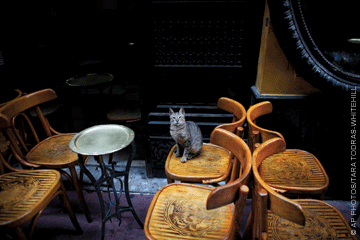

What was the mood like when you got to Libya, and how has it evolved?
The mood in Libya when I first got there was incredibly exuberant. The rebels had taken Benghazi and were pushing forward. It looked like they were going to go all the way and take Sirte. It was also amazing because for the first time the Libyans I met felt comfortable expressing their displeasure with the regime, which is something they had never been able to do before.
Towards the end of the two weeks I was there, there was a feeling of being on the losing team and resolve that they were going to fight to the end. The idea of going back to the people they were before, and how scared they were to express what they were feeling, wasn’t even an option. Their spirit was never broken, even as they were pushed back.
Do you have people watching over you and trying to control what you shoot?
There are definitely times where you come upon a situation where people want you to shoot something—or not shoot something—because it might look bad. In Egypt there is definitely a sense of pride in their country, and sometimes if you tried to take a not-so pretty picture they would object. My lesson with that is to envision the photo in my head beforehand, then take only a few pictures and hightail it out of there. I don’t think for the most part there was an understanding of what journalists are allowed to do, and why we can’t use a set-up picture—it’s a process, I think, that comes with free speech and understanding the way the international news industry works.
Does the fact that Muammar Qaddafi is mentally unhinged make the situation there more unnerving for a foreign journalist than, say, Egypt, where those in positions of power don’t appear to be unhinged but gangs of pro-Mubarak supporters sometimes beat and killed civilians?
Sure. You just have no idea what to expect from Qaddafi, and that is unnerving. He has said that people who entered the border illegally from Egypt will be treated like Al-Qaeda, so it’s definitely more than a bit scary. And even though there were problems in Egypt, I had more of a sense of where I was and what to expect.
It’s horrible that some women had trouble in Egypt, especially since it was really not indicative of how in general women were treated during the revolution. I feel very lucky that I didn’t have trouble there, and I hope that is partially because I knew problematic areas and where I shouldn’t go. Of course, trouble can find you anywhere, and it looks like a few women were targeted, so I just feel very lucky that I didn’t have those problems.

Over the weekend [March 19-20], the US became actively involved in the Libyan conflict. What was your reaction to that, or do you try to block out personal thoughts about a situation you can’t control?
When I was on the ground there and people would ask what my nationality was, they then always asked where Obama was. I even got phone calls from doctors at the hospitals on the front pleading for information about a no-fly zone—as if, being an American, I had more information than anyone else. As a journalist you try not to get involved, but when you see people begging you to tell your government to create a no-fly zone while standing at a hospital watching injured rebels come in from airstrikes, it does get to you. I just tried to tell the Libyans that I was trying to show the world what was happening through my pictures, and that the world was watching.
Has your US citizenship helped or hindered your efforts
and safety?
In Libya people were really happy that I was American. They greeted us with open arms. In Egypt a lot of the weapons that the police were using on the protesters were made in the USA. That was a bit harder because they were angry at the Americans for helping the government injure them, even if it wasn’t at all a directive from the US government.
Is anybody responsible for your well-being?
The Associated Press is my employer and they are extremely invested in my well-being. Of course, as a photographer you always want to go forward and take the best picture, which might mean you aren’t necessarily in the safest places. There is a balance that comes in taking great pictures and trying to stay safe. As photographers we are usually right in the middle of the action, and we have to make those decisions on the ground on a minute-by-minute basis. AP understands that and helps to support us, and to use the information at hand to make the best choices so that we can continue to work and stay safe. Also, my boyfriend works for the State Department and was constantly checking in, providing context (because we had very little outside contact)—and, along with my family, providing moral support.


